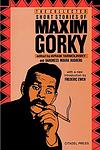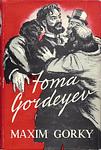Maxim Gorky
Maxim Gorky, born Alexei Maximovich Peshkov on March 28, 1868, was a Russian and Soviet writer, a founder of the socialist realism literary method, and a political activist. He was a five-time nominee for the Nobel Prize in Literature. Gorky's most famous works include 'The Lower Depths', 'Twenty-six Men and a Girl', 'My Childhood', 'Mother', and 'Enemies'. His writing style was characterized by its vivid characters, depiction of the lives of the lower classes, and criticism of the socio-political system of Russia. Gorky was also a close associate of other Russian greats like Leo Tolstoy and Anton Chekhov.
Books
This list of books are ONLY the books that have been ranked on the lists that are aggregated on this site. This is not a comprehensive list of all books by this author.
-
1. My Childhood
"My Childhood" is a poignant and powerful autobiographical account of a young boy's life in 19th-century Russia. The narrative explores the harsh realities of growing up in a dysfunctional family, with a cruel stepfather and an uncaring mother, against the backdrop of poverty and social unrest. The protagonist's struggles, resilience, and observations provide a vivid portrayal of the societal conditions of the time, while also illuminating the human capacity for hope and perseverance in the face of adversity.
-
2. Other Fires
This book delves into the lives of individuals grappling with the harsh realities of the Russian lower class at the turn of the 20th century. Through a series of interconnected stories, the narrative explores themes of poverty, injustice, and the struggle for survival in a society marked by deep social divides. The characters, each facing their own battles against a backdrop of societal turmoil, seek solace and meaning in their lives, often through acts of rebellion or the pursuit of personal freedom. The work is a poignant reflection on human resilience and the quest for dignity amidst the challenges of an unforgiving social landscape.
-
3. The Collected Short Stories of Maxim Gorky
This collection of short stories showcases the work of a renowned Russian author who is known for his realistic and empathetic portrayal of the lower classes. Each story provides a vivid depiction of the hardships and struggles faced by the poor and marginalized in society, often highlighting their resilience and spirit in the face of adversity. The author's skillful use of language and his deep understanding of human nature make these stories both compelling and thought-provoking, offering a poignant commentary on social inequality and injustice.
-
4. Foma Gordeyev
This novel delves into the life of Foma Gordeyev, a young man who inherits a vast business empire from his powerful and wealthy father. Struggling to find his place in a world driven by greed and corruption, Foma becomes disillusioned with the moral decay he sees in those around him, including his own family. As he grapples with his ideals and the harsh realities of human nature and society, Foma's journey is a poignant exploration of the quest for meaning in a materialistic world. The narrative, rich in philosophical introspection, captures the tumultuous changes of Russia at the turn of the 20th century, reflecting on the individual's struggle against the tide of societal norms and expectations.
-
5. Summerfolk
The book is a classic Russian play that delves into the lives of a diverse group of middle-class Russians who are spending their summer vacation at a rural retreat on the Volga River. Through a series of vignettes and dialogues, the play explores the disillusionment, personal crises, and social conflicts of the characters as they grapple with their own failings and the societal changes around them. The retreat serves as a microcosm of pre-revolutionary Russian society, highlighting the contrasts between the privileged and the working class, while also examining the existential questions and moral dilemmas faced by individuals in a rapidly changing world.




